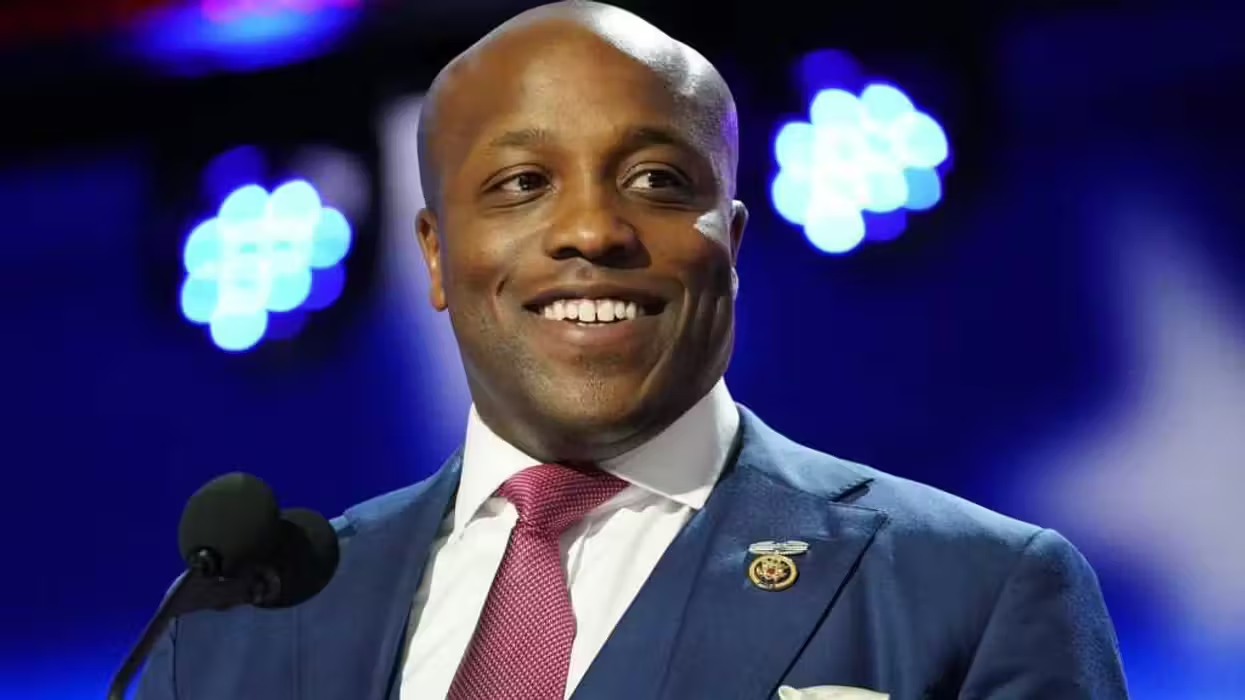
© 2025 Blaze Media LLC. All rights reserved.
This Anti-Federalist paper about presidential power from 1787 will give you goosebumps
February 13, 2014
"...he therefore fancies that he may be great and glorious by oppressing his fellow citizens, and raising himself to permanent grandeur on the ruins of his country."
In light of President Obama's "I've got a pen, and I've got a phone" comments followed by calls for direct executive action in his State of the Union, Senator Rand Paul's 4th Amendment suit being filed against the President over NSA surveillance, the recent controversy over perceived pay-to-play appointments of U.S. ambassadors and the President's joke about being able to do whatever he wants to French President Francois Hollande at Monticello, we found the below excerpt particularly striking.
 President Barack Obama delivers his State of the Union address on Capitol Hill in Washington, Tuesday Jan. 28, 2014. (AP Photo/Charles Dharapak)
President Barack Obama delivers his State of the Union address on Capitol Hill in Washington, Tuesday Jan. 28, 2014. (AP Photo/Charles Dharapak)
It comes from Cato's Letter IV of the "Anti-Federalist Papers," dated November 8, 1787. All emphasis is courtesy of "Cato" (likely George Clinton).
It is remarked by Montesquieu, in treating of republics, that in all magistracies, the greatness of the power must be compensated by the brevity of the duration; and that a longer time than a year, would be dangerous. It is therefore obvious to the least intelligent mind, to account why, great power in the hands of a magistrate, and that power connected, with a considerable duration, may be dangerous to the liberties of a republic--the deposit of vast trusts in the hands of a single magistrate, enables him in their exercise, to create a numerous train of dependents--this tempts his ambition,which in a republican magistrate is also remarked, to be pernicious and the duration of his office for any considerable time favors his views, gives him the means and time to perfect and execute his designs--he therefore fancies that he may be great and glorious by oppressing his fellow citizens, and raising himself to permanent grandeur on the ruins of his country.--And here it may be necessary to compare the vast and important powers of the president, together with his continuance in office with the foregoing doctrine--his eminent magisterial situation will attach many adherents to him, and he will be surrounded by expectants and courtiers--his power of nomination and influence on all appointments--the strong posts in each state comprised within his superintendence, and garrisoned by troops under his direction--his[sharequote align="center"]Ambition with idleness...aversion to truth...but above all...the perpetual ridicule of virtue[/sharequote]
control over the army, militia, and navy--the unrestrained power of granting pardons for treason, which may be used to screen from punishment, those whom he had secretly instigated to commit the crime, and thereby prevent a discovery of his own guilt-- his duration in office for four years: these, and various other principles evidently prove the truth of the position-- that if the president is possessed of ambition, he has power and time sufficient to ruin his country.
Though the president, during the sitting of the legislature, is assisted by the senate, yet he is without a constitutional council in their recess--he will therefore be unsupported by proper information and advice, and will generally be directed by minions and favorites, or a council of state will grow out of the principal officers of the great departments, the most dangerous council in a free country.
The ten miles square, which is to become the seat of government, will of course be the place of residence for the president and the great officers of state--the same observations of a great man will apply to the court of a president possessing the powers of a monarch, that is observed of that of a monarch--ambition with idleness--baseness with pride--the thirst of riches without labour--aversion to truth-- flattery--treason--perfidy--violation of engagements--contempt of civil duties--hope from the magistrate's weakness; but above all, the perpetual ridicule of virtue--these, he remarks, are the characteristics by which the courts in all ages have been distinguished.
The language and the manners of this court will be what distinguishes them from the rest of the community, not what assimilates them to it, and in being remarked for a behavior that shows they are not meanly born, and in adulation to people of fortune and power.
Want to leave a tip?
We answer to you. Help keep our content free of advertisers and big tech censorship by leaving a tip today.
Want to join the conversation?
Already a subscriber?
Ben Weingarten is a writer, commentator, and editor at large at RealClearInvestigations. He is a senior contributor at the Federalist and writes columns for Newsweek and the Epoch Times.
Ben Weingarten
Ben Weingarten is a writer, commentator, and editor at large at RealClearInvestigations. He is a senior contributor at the Federalist and writes columns for Newsweek and the Epoch Times.
more stories
Sign up for the Blaze newsletter
By signing up, you agree to our Privacy Policy and Terms of Use, and agree to receive content that may sometimes include advertisements. You may opt out at any time.
Related Content
© 2025 Blaze Media LLC. All rights reserved.
Get the stories that matter most delivered directly to your inbox.
By signing up, you agree to our Privacy Policy and Terms of Use, and agree to receive content that may sometimes include advertisements. You may opt out at any time.






